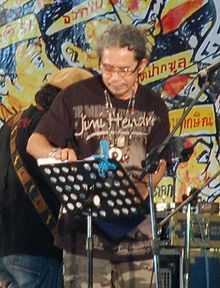Phleng phuea chiwit
| Phleng phuea chiwit | |
|---|---|
| Stylistic origins | Folk, Thai music, rock, luk thung |
| Cultural origins | 1973, Thailand |
| Typical instruments | Vocal - Guitar - Bass - Drums - and occasional use of Keyboard - Harmonica - Percussion - Violin - Piano - Thai instruments |
| Other topics | |
| 1973 Thai popular uprising - Luk thung | |
Phleng phuea chiwit (Thai: เพลงเพื่อชีวิต [pʰleːŋ pʰɯː tɕʰiːwit̚]; lit. "Songs for Life") describes to Thai folk music, strongly influenced by elements of Western folk and rock music with a protest theme mainly centred around the hardship of working-class people. The term Phleng phuea chiwit (Songs for Life) was from "Art for life" or "Literature for life" that is literature on the life and society, while Phleng phuea chiwit era flourishing in 1970s also known as "Jewel of the literature of life".[1]
History

In the 1980s, phleng pheua chiwit were influenced by rock music, such as Hammer, Pongsit Kamphee, Pongthep Kradonchamnan and Carabao, that gained popularity in 1980s. While many artist of the 1990s influenced by genres such as Luk thung, Traditional Thai music and Reggae including Indochine, Kon Darn Kwean, Maleehuana, Hope Family, Noo-Miter, Jaran Manopetch, Katorn, Zu Zu and Su Boonleang. though a rock artists influenced by Phleng phuea chiwit genre such as Palaphol Pholkongseng, Thanapol "Suea" Intharit and Sib Lor (led by Hugo).
Styles
Phleng pheua chiwit typically incorporates elements of Western as well as Thai folk ballads, more rhythmic Thai styles such as samcha, molam and luk thung, and occasionally elements of Thai classical music as well. More recently, elements of reggae, ska and Latin music have found their way into the genre as well. As for the instrumentation, early phleng pheua chiwit was generally in a more folk style, with acoustic instruments, while later versions often more rock-style arrangements, with electric guitars, bass and drums. Many artists also use Thai instruments such as the phin, wut, khluay, and saw. and some Phleng phuea chiwit artists was inspired from Western musician include Bob Dylan, Bob Marley, Simon & Garfunkel and Neil Young.
References
- ↑ Anniversary 40 years, 1973 Thai popular uprising" Thai PBS, 25 October 2013.(Thai)
- ↑ books.google.com Pongsit Kamphee
- ↑ seasite.niu.edu
External links
- Forlifethailand.com (Thai)